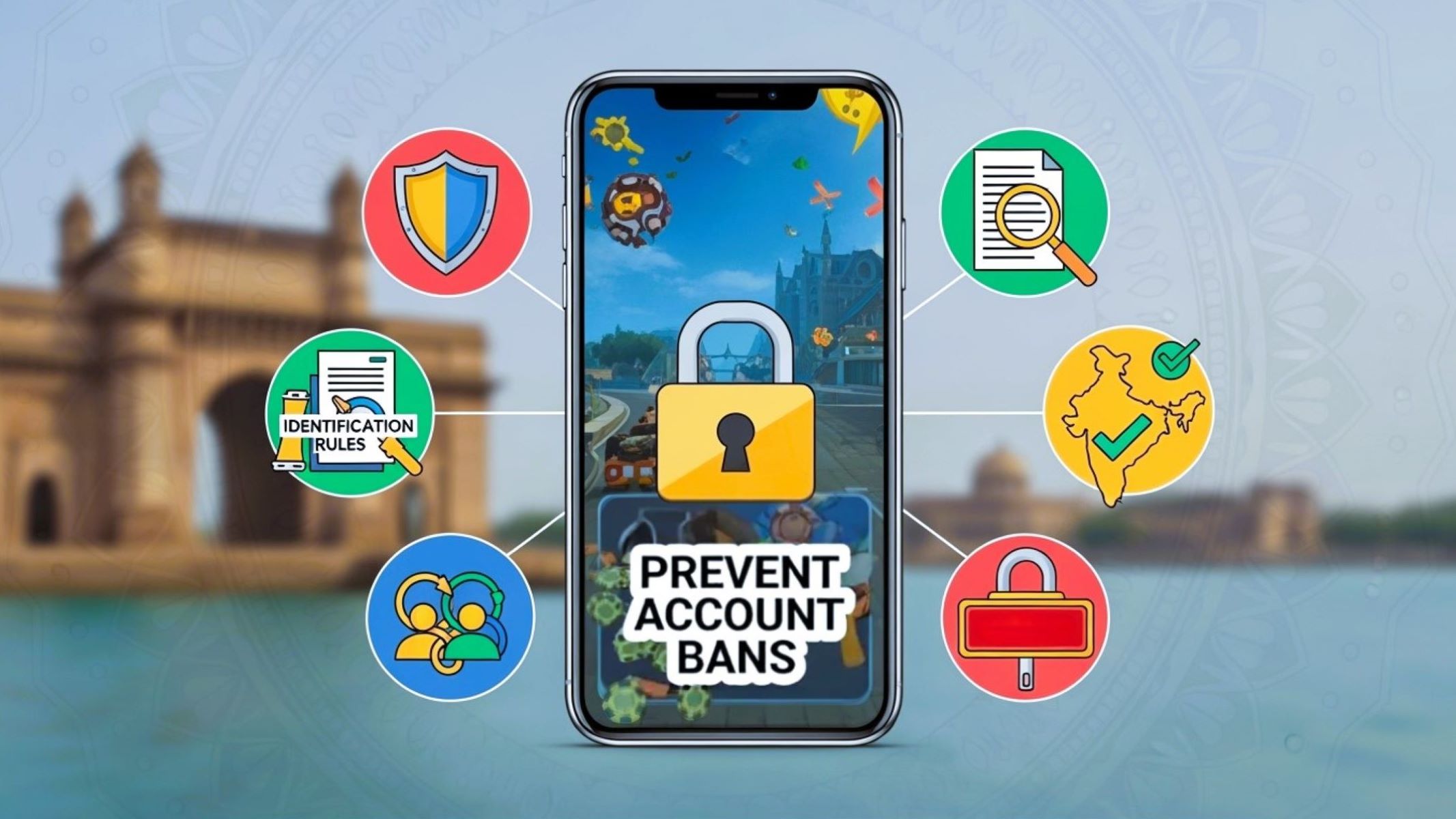How to Avoid Duplicate Account Bans
Online platforms in India — whether for gaming, betting, e-commerce, or streaming — are becoming increasingly strict about duplicate account policies. Operators invest heavily in fraud detection systems, and getting banned due to multiple accounts can mean losing access to funds, bonuses, or entire services. If you’ve ever wondered how to avoid duplicate account bans in India, this guide is for you. We’ll break it down step by step, explain why these bans happen, how platforms detect them, and how you can stay compliant while protecting your account.
Why Platforms Ban Duplicate Accounts
Understanding why platforms are strict about duplicate accounts is crucial if you want to avoid getting banned. One of the main reasons is preventing bonus abuse. Many users try to exploit welcome offers or promotional bonuses by creating multiple accounts, which can cost platforms a lot of money. Companies invest heavily in marketing and promotions, and repeated abuse can disrupt their financial planning. By banning duplicates, they ensure that each promotion is used fairly and only by genuine new users. This keeps the system balanced and rewards those who follow the rules.
Another significant reason is maintaining fair play, especially on gaming and betting platforms. If one person controls multiple accounts, it can create an unfair advantage, skewing results or outcomes. In competitive environments, fairness is everything. Platforms want all users to have an equal chance, and duplicate accounts can undermine the integrity of games or betting markets. This not only affects other players but can also damage the platform’s reputation if cheating becomes widespread.
Fraud prevention is also a major factor. Duplicate accounts are often linked to suspicious activities such as money laundering, identity theft, or coordinated cheating. By monitoring and banning accounts that appear connected, platforms reduce the risk of financial fraud and protect legitimate users. This is particularly important in India, where regulatory authorities are strict about online financial transactions. Preventing fraud safeguards both the users’ money and the platform’s credibility.
Finally, platforms must comply with Indian KYC and regulatory requirements. Indian law requires platforms to verify users’ identities accurately, often using Aadhaar, PAN, or other government IDs. Multiple accounts under the same identity can violate these rules and attract penalties. By enforcing a one-account-per-user policy, platforms ensure legal compliance and make sure that all users are genuine. Understanding these reasons helps users appreciate why duplicate account bans are taken seriously and encourages safer, rule-abiding behavior online.
How Platforms Detect Duplicate Accounts
- KYC Verification
- Tracks Aadhaar, PAN, passport, and other government-linked IDs
- Ensures each ID is unique and prevents multiple accounts under one identity
- Device Fingerprinting
- Monitors IP addresses, cookies, and device IDs
- Flags multiple accounts accessed from the same device
- Payment Tracking
- Checks UPI IDs, bank accounts, credit/debit cards
- One payment method per account; shared methods raise suspicion
- Behavioral Analytics
- Observes login times, game choices, betting patterns
- Detects unnatural or repeated behavior across multiple accounts
- Location Monitoring
- Uses GPS or IP-based geolocation
- Flags multiple accounts from the same location
- Cross-referencing Multiple Data Points
- Combines KYC, device, payment, behavior, and location data
- Makes it extremely difficult to bypass detection without being flagged
- Account History Analysis
- Reviews past account activity and transactions
- Identifies patterns consistent with duplicate account creation
- IP Address Clustering
- Groups accounts logging in from similar IP ranges
- Detects potential network-based attempts to create multiple accounts
- Login Pattern Recognition
- Compares session times, frequency, and duration
- Highlights abnormal activity that suggests account duplication
- Automated Risk Scoring
- Assigns risk scores to new and existing accounts based on data points
- Accounts exceeding a threshold are flagged for review
Understand the Indian KYC Framework
| KYC Aspect | Requirement | Purpose | Common Documents | Impact of Non-Compliance |
| Mandatory Identity Proof | Must submit valid government ID | Verify user’s true identity | Aadhaar, PAN, Voter ID, Passport | Account creation blocked; possible blacklisting |
| Address Verification | Proof of current residential address required | Ensure correspondence and KYC match | Utility bills, bank statements | Withdrawal issues; account flagged for verification |
| Face Authentication | Optional but increasingly required | Prevent impersonation and fraud | Selfie, video verification | Restricted access; higher verification scrutiny |
| One ID = One Account | Each ID linked to only one account | Prevent duplicate accounts and bonus abuse | PAN, Aadhaar | Duplicate accounts detected; potential permanent ban |
| Honest Submission | All information must be accurate | Maintain legal compliance and platform trust | KYC forms, documents matching government records | Legal penalties; cross-platform blacklisting |
Common Mistakes That Lead to Duplicate Account Bans
Many users end up banned not because they want to cheat, but because of small, easily overlooked mistakes. One of the most common errors is signing up with a different email while still using the same phone number. Platforms often link phone numbers to unique accounts, so even if your email looks different, the system can detect duplication. Overlooking this connection can lead to account suspension without warning, leaving users frustrated and confused.
Reusing the same PAN or Aadhaar across multiple accounts is another frequent pitfall. Since these government-issued IDs are directly linked to KYC verification, platforms immediately flag any repetition. Even if you think using a different name or email might hide your activity, the ID itself is a clear indicator of duplication. This is why Indian platforms enforce strict “one ID, one account” policies — to maintain security and prevent misuse.
Logging in from shared devices at home, work, or public spaces can also trigger duplicate account flags. Platforms track device fingerprints including IP addresses, browser data, and hardware information. If multiple accounts are accessed from the same device, even accidentally, it can look suspicious. This is especially important in households with multiple users, where innocent activity can be mistaken for deliberate account duplication.
Finally, attempting to claim signup bonuses across multiple profiles or using friends’ or family members’ IDs for additional accounts is a common mistake that often leads to bans. Platforms are designed to detect bonus abuse and unusual patterns, and repeated attempts quickly trigger alerts. Avoiding these missteps, using only your verified ID, and keeping your login details unique ensures your account remains safe and in good standing.
Step-by-Step Guide to Avoid Duplicate Account Bans
- Read the Terms and Conditions
- Take the time to carefully read each platform’s rules regarding duplicate accounts
- Understand what is allowed and what can trigger a ban
- Familiarize yourself with the platform’s KYC and bonus policies
- Stick to a Single Identity
- Use only one email address, phone number, and government ID for KYC verification
- Avoid creating multiple accounts under different names or emails
- Ensure that your personal information is consistent across all interactions
- Keep Your Devices Clean
- Clear cookies, cache, and browsing history regularly
- Avoid logging into multiple accounts from the same device whenever possible
- Consider using separate devices for separate accounts only if they are fully legitimate
- Avoid Bonus Chasing
- Refrain from signing up repeatedly just to claim signup bonuses or promotional offers
- Understand that platforms monitor bonus usage and repeated claims raise red flags
- Focus on long-term account activity rather than short-term rewards
- Update Your KYC Regularly
- Keep your personal and address details current with the platform
- If your government ID or address changes, update the KYC instead of creating a new account
- Regular updates help maintain compliance and prevent unintentional duplicate flags
- Maintain Transparency with Support
- Inform platform support if multiple household members use the same service
- Provide accurate information about shared devices or payment methods
- Proactive communication can prevent accidental bans
- Monitor Account Activity
- Regularly review login alerts, withdrawals, and notifications
- Respond promptly to verification requests or suspicious activity alerts
- Early attention reduces the chance of automated bans
- Use Unique Payment Methods
- Ensure each account has its own bank account, UPI ID, or card
- Avoid sharing financial information between multiple accounts
- Properly linked payment methods reinforce your account’s legitimacy
- Protect Login Credentials
- Use strong, unique passwords for every account
- Avoid sharing credentials with friends or family
- Enable two-factor authentication whenever possible
Impact of Duplicate Account Bans in India
| Consequence | Impact on You | Financial Effect | Access Restrictions | Long-Term Implications |
| Loss of Funds | Wallet balances are frozen permanently | Money in account becomes inaccessible | Cannot use funds for deposits, bets, or games | Recovery is difficult; may require lengthy verification |
| Bonus Forfeiture | Unused rewards, cashback, or promotional offers vanish | Loss of potential earnings or perks | Cannot claim previous or future bonuses | Reduces overall profitability from platform participation |
| Cross-Platform Blacklists | Multiple operators may share fraud databases | Limits ability to open accounts elsewhere | Other platforms may block your account creation | Long-term damage to online reputation within the industry |
| KYC Rejection | Future verifications flagged due to previous account violations | No immediate financial loss | New accounts may be denied access | Can affect access to multiple platforms requiring KYC |
| Legal Trouble | In extreme cases, authorities may get involved | Possible fines or penalties | Account freezes or legal hold on funds | May lead to scrutiny across financial and gaming platforms |
| Account Suspension Duration | Bans can last temporarily or permanently depending on severity | Temporary or permanent inability to use funds | Platform access restricted | Extended suspension impacts online activity and trustworthiness |
| Reputation Damage | Being flagged as a duplicate user | Indirect financial loss from missed opportunities | Reduced trust with platform customer service | Harder to resolve issues or appeal decisions in the future |
| Transaction Monitoring | All future transactions may be closely watched | Potential delays in withdrawals or deposits | Limits on account activity | Continuous scrutiny increases risk of accidental non-compliance |
How Gambling and Betting Platforms Enforce Bans
Gambling and betting platforms in India are particularly strict when it comes to duplicate accounts, and there’s a good reason for it. These platforms deal with real money, which attracts both legitimate users and potential fraudsters. Since Indian gambling laws vary widely by state, operators must comply with multiple layers of regulation. This means that even a minor violation, such as creating a second account, can trigger automated or manual account reviews, and potentially lead to permanent bans. The systems in place are designed to maintain fairness, protect users’ funds, and ensure legal compliance.
One of the key enforcement mechanisms is multiple PAN matching. All real-money platforms now link PAN numbers to account creation, which makes it nearly impossible for a single individual to create multiple accounts using different names or emails. If a platform detects that the same PAN is associated with multiple profiles, it will immediately flag and often suspend all related accounts. This is part of broader KYC compliance that platforms are legally obligated to follow, ensuring that all users are verified and traceable.
Another method is payment gateway monitoring. Platforms track UPI IDs, bank accounts, and card details to detect repeated use across multiple accounts. If your payment source is flagged, deposits can be blocked, not just on one account but across multiple platforms connected to the same payment method. This approach prevents bonus abuse and financial fraud, making it critical for users to maintain unique and verified payment information for each account.
Geo-fencing restrictions also play a significant role in enforcement. Certain states, such as Telangana and Andhra Pradesh, have stricter gambling regulations. Platforms use IP addresses and GPS data to enforce these rules. Accounts flagged for violations in restricted regions may face an account-wide ban, even if other parts of India allow gambling. Staying compliant by using verified IDs, unique payment methods, and following state-specific regulations ensures smoother gameplay and reduces the risk of unexpected account suspensions.




